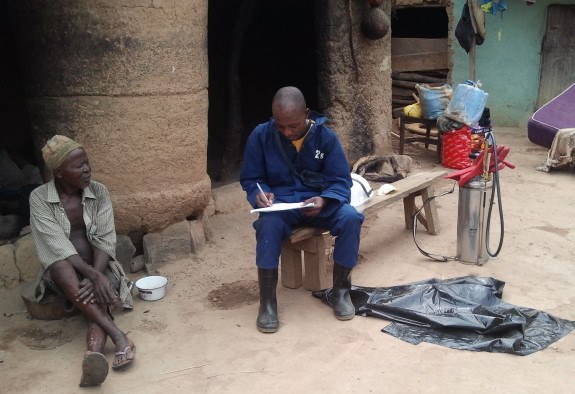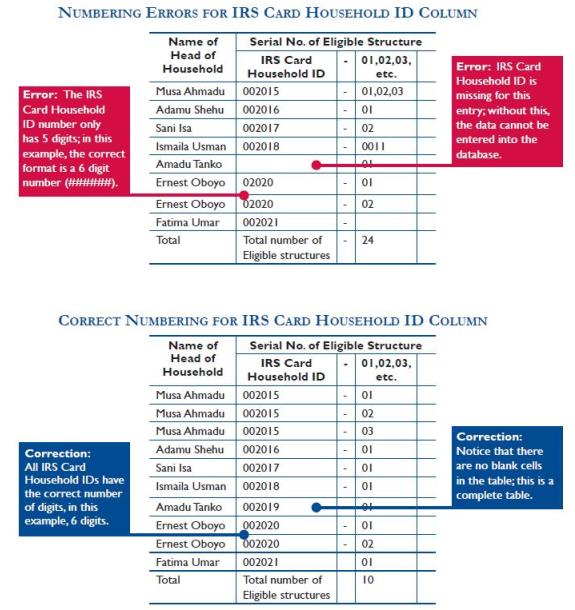To monitor project performance, AIRS collects data on structures sprayed, pregnant women and children under five protected from malaria, seasonal staff trained, and several other indicators.
Data is how we judge the value and impact of public health programs. However, like many global health professionals, AIRS staff work in low-income countries where data are often collected on paper forms and manually entered into databases, which can lead to errors in data entry.
The Africa Indoor Residual Spraying (AIRS) project protects people in 13 African countries from malaria by spraying homes with insecticides that kill mosquitoes that transmit malaria. To monitor project performance, AIRS collects data on structures sprayed, pregnant women and children under five protected from malaria, seasonal staff trained, and several other indicators.
One of the first measures AIRS staff record is if residents will allow their homes to be sprayed. Before spraying, AIRS staff or partners go door-to-door in target districts to meet with families, explain how indoor spraying will protect them from malaria, and encourage residents to have their home sprayed. Responses are carefully recorded. While reviewing these records, AIRS Nigeria monitoring and evaluation specialists Joseph Okeke and Funto Adejuwon noticed recurring common errors. They had an idea to help staff spot these errors and correct them before data were entered into the database, at which point it becomes very difficult to correct.
Enter the AIRS M&E Error Eliminator.
Okeke and Adejuwon created a simple tool that calls out common errors in data collection forms and displays correct and incorrect forms side-by-side. All staff helping to implement or supervise the collection of data are trained to use the M&E Error Eliminator. At the end of each day, team leaders or supervisors randomly check a few data collection forms against the M&E Error Eliminator. If they see that data are entered incorrectly, they notify the data collector and make him or her return to the household to correct the information.
“The principle behind this is that the field workers are from the start introduced to these common errors and also instructed on how to avoid them,” said Okeke.
Results
- Better quality data. Workers recognize and stop data entry errors. Supervisors spot check data entry forms and have workers make corrections before data are entered into the database.
“The Error Eliminator was a highly effective tool for overseeing the quality of work done by my spray operators on a daily basis,” said Bala Ishaya Makuson, spray team leader, Nassarawa Eggon Local Government Area.
- Improved supervision. The M&E Error Eliminator provides a standard method of identifying and correcting errors, which makes supervision easier and faster. Data collection also improves as the campaign progresses because errors are addressed and reconciled with workers from day one of the indoor residual spraying campaign.
- Faster data entry. The M&E Error Eliminator has cut down on data entry time as data clerks no longer have to spend long hours looking out for and correcting common errors.
- Scaleable. The M&E Error Eliminator emerged from the ingenuity of AIRS Nigeria staff. It is being implemented in all 13 countries where AIRS implements IRS.
- Sustainable.Partners from the National Malaria Control Program (NMCP), State Ministry of Health, National Environmental Standards Regulatory and Enforcement Agency, and Local Government Authority health offices play a critical role in ensuring proper data collection. In 2012 and 2013, government staff received training and participated in supervision teams that visit work sites every day of the IRS campaign to monitor work. Now the NMCP and other government partners have staff with the knowledge, experience, and tools to supervise and review spray data collection.
“The M&E [Error Eliminator] tool used during the spray operation was vital as it provided guided information for effective supervision. It also enabled a more rigorous monitoring of the performance of the spray operators,” said Ezechukwu Adaolisa, medical lab scientist, NMCP.
Since supervision is a core component of a successful IRS campaign, AIRS developed several easy-to-use tools to improve spray operations, environmental compliance and monitoring and evaluation, including the M&E Error Eliminator. The tools comprise the AIRS Better Indoor Residual Spraying Supervision Toolkit.
This story was taken from www.africairs.net


